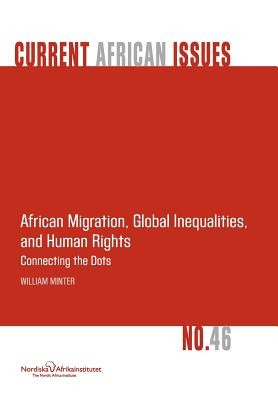
- We will send in 10–14 business days.
- Author: William Minter
- Publisher: Nordic Africa Institute
- Year: 2011
- Pages: 96
- ISBN-10: 9171066926
- ISBN-13: 9789171066923
- Format: 17 x 24.4 x 0.5 cm, minkšti viršeliai
- Language: English
- SAVE -10% with code: EXTRA
African Migration, Global Inequalities, and Human Rights. Connecting the Dots (e-book) (used book) | bookbook.eu
Reviews
Description
Migration from and within Africa, just like migration elsewhere in the world, often generates anti-immigrant sentiment and ignites heated public debate about the migration policies of the destination countries. These countries include South Africa as well as others outside the continent. The countries of origin are also keen to minimize losses through "brain drain" and to capture resources such as remittances. Increasingly, international organizations and human rights advocates have stressed the need to protect the interests of migrants themselves. However, while the UNDP's 2009 Human Development Report talks of "win-win-win" solutions, in practice it is the perceived interests of destination countries that enjoy the greatest attention, while the rights of migrants themselves are afforded the least. Yet migration is not just an issue in itself: it also points to structural inequalities between countries and regions. Managing migration and protecting migrants is too limited an agenda. Activists and policymakers must also address these inequalities directly to ensure that people can pursue their fundamental human rights whether they move or stay. It is not enough to measure development only in terms of progress at the national level: development must also be measured in terms of reductions in the gross levels of inequality that now determine differential rights on the basis of accident of birth.
- Author: William Minter
- Publisher: Nordic Africa Institute
- Year: 2011
- Pages: 96
- ISBN-10: 9171066926
- ISBN-13: 9789171066923
- Format: 17 x 24.4 x 0.5 cm, minkšti viršeliai
- Language: English English
Migration from and within Africa, just like migration elsewhere in the world, often generates anti-immigrant sentiment and ignites heated public debate about the migration policies of the destination countries. These countries include South Africa as well as others outside the continent. The countries of origin are also keen to minimize losses through "brain drain" and to capture resources such as remittances. Increasingly, international organizations and human rights advocates have stressed the need to protect the interests of migrants themselves. However, while the UNDP's 2009 Human Development Report talks of "win-win-win" solutions, in practice it is the perceived interests of destination countries that enjoy the greatest attention, while the rights of migrants themselves are afforded the least. Yet migration is not just an issue in itself: it also points to structural inequalities between countries and regions. Managing migration and protecting migrants is too limited an agenda. Activists and policymakers must also address these inequalities directly to ensure that people can pursue their fundamental human rights whether they move or stay. It is not enough to measure development only in terms of progress at the national level: development must also be measured in terms of reductions in the gross levels of inequality that now determine differential rights on the basis of accident of birth.


Reviews